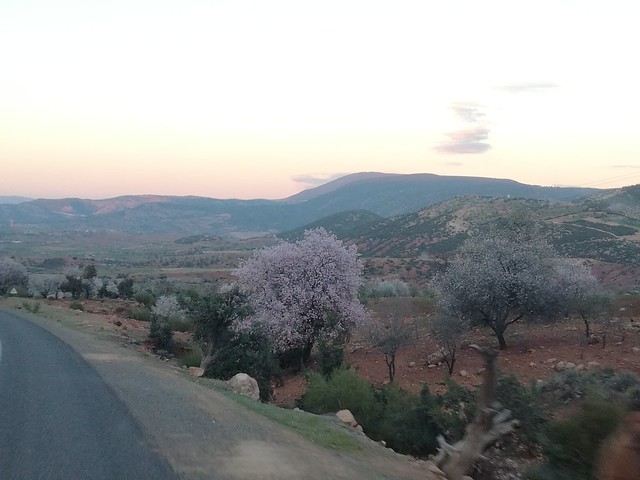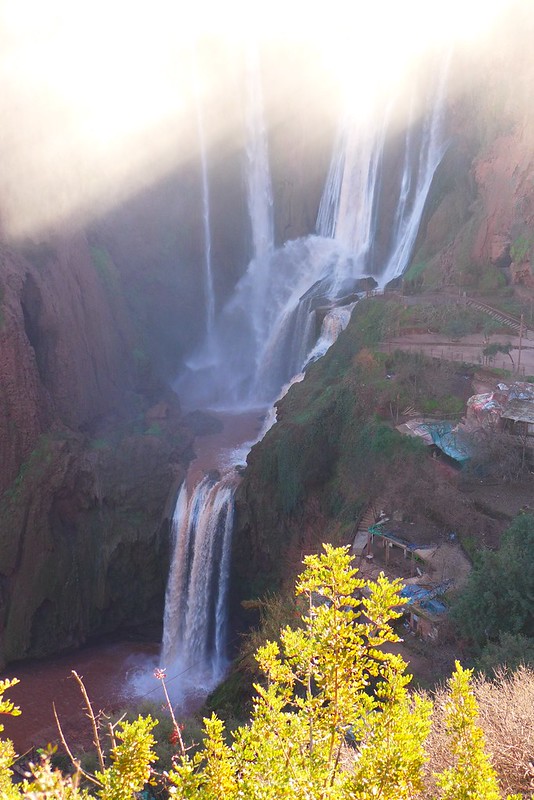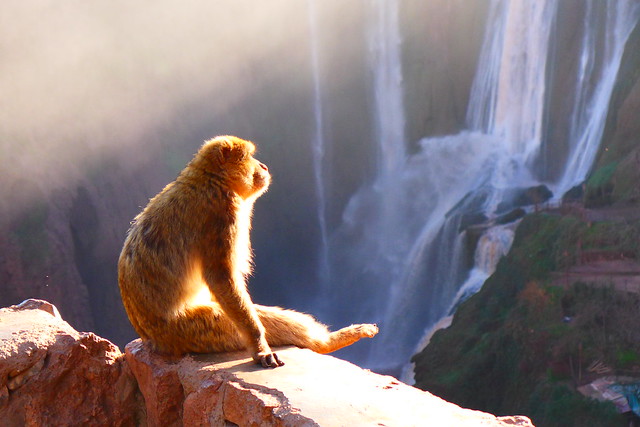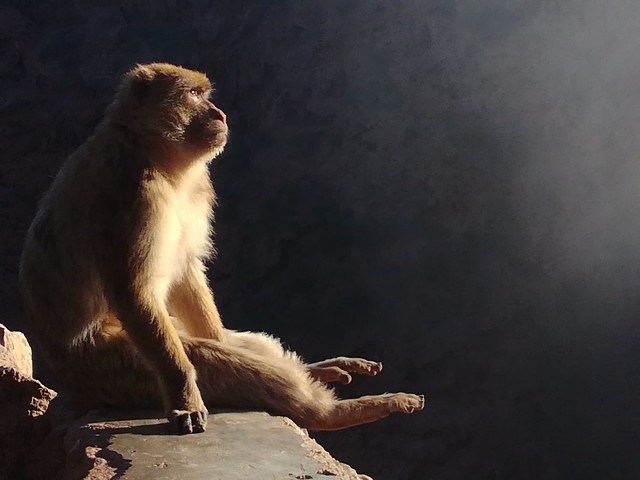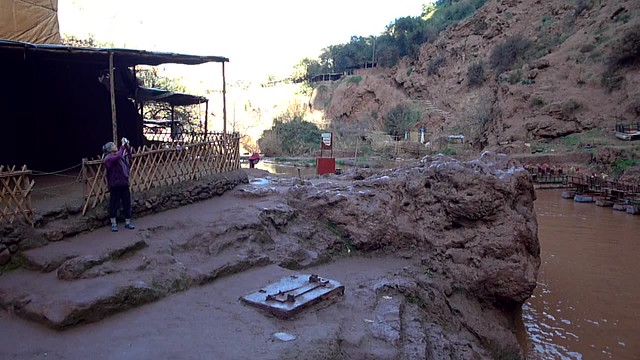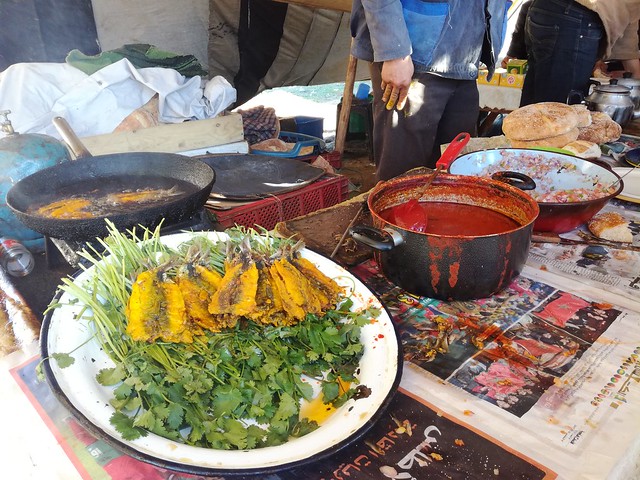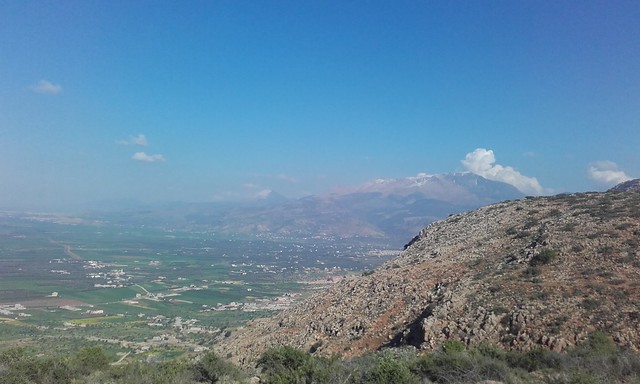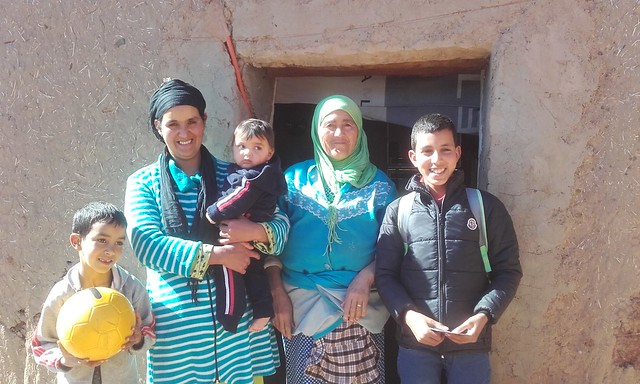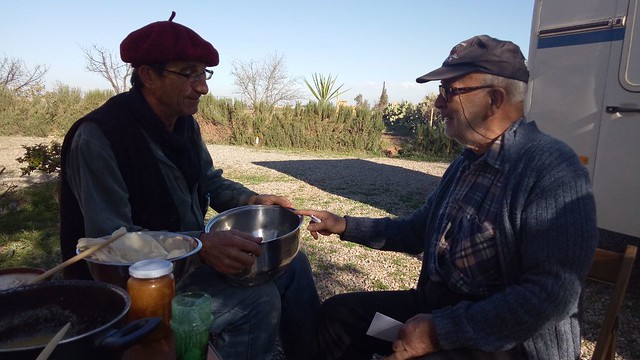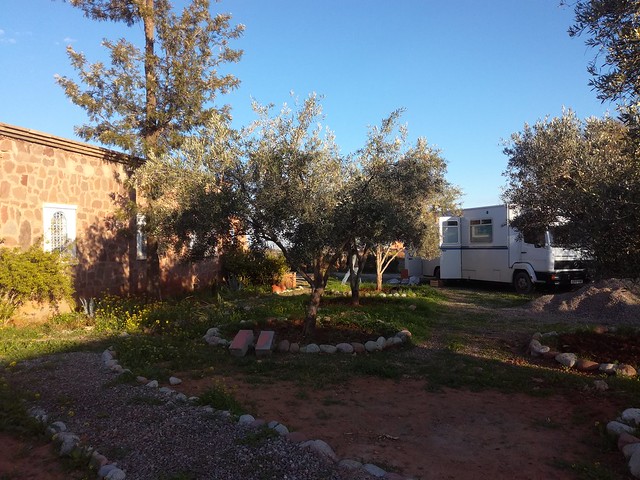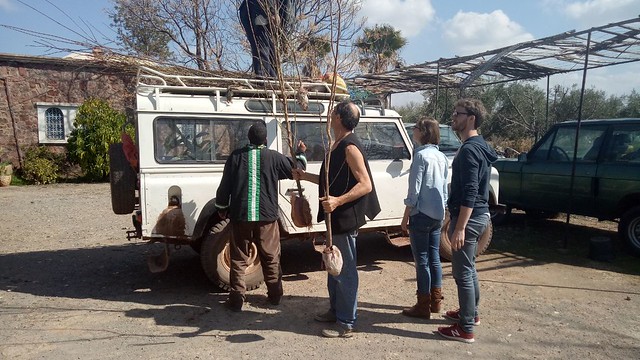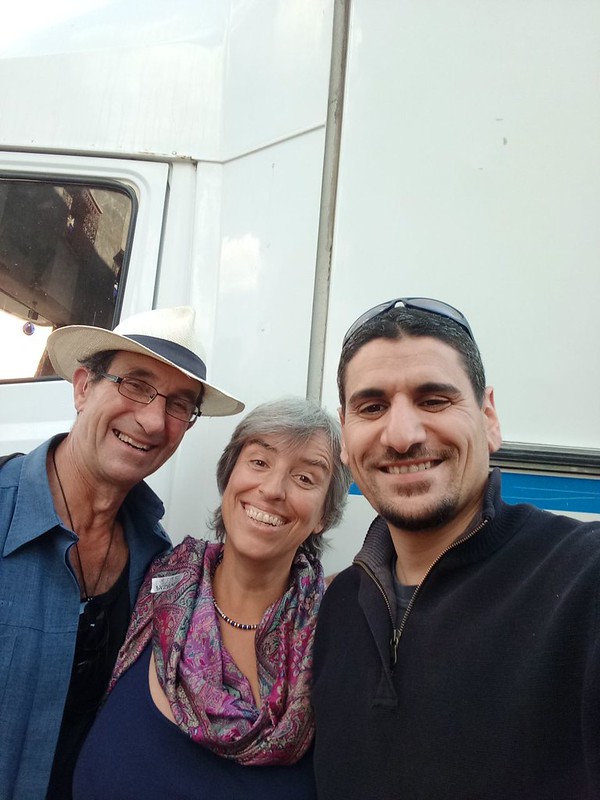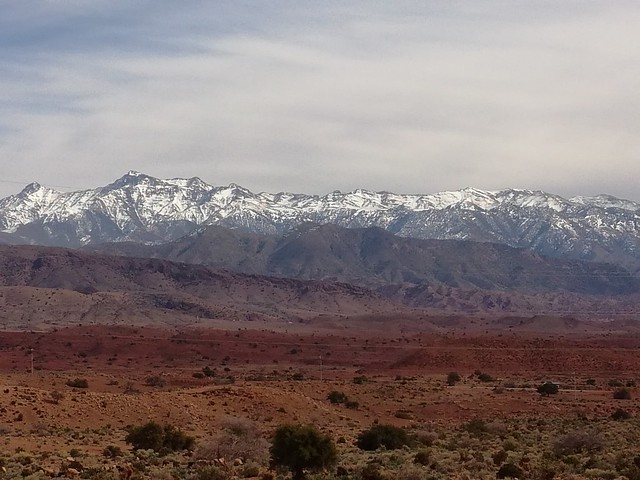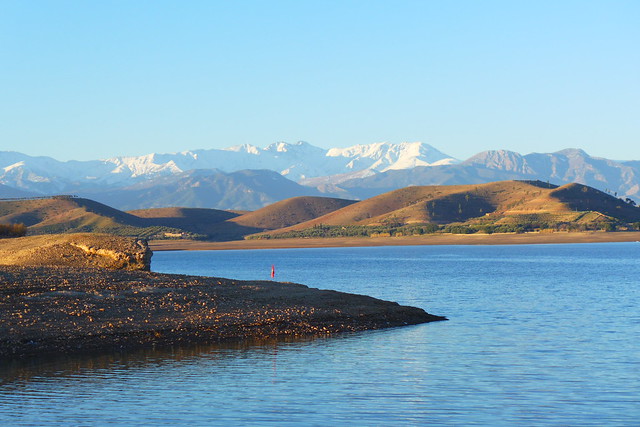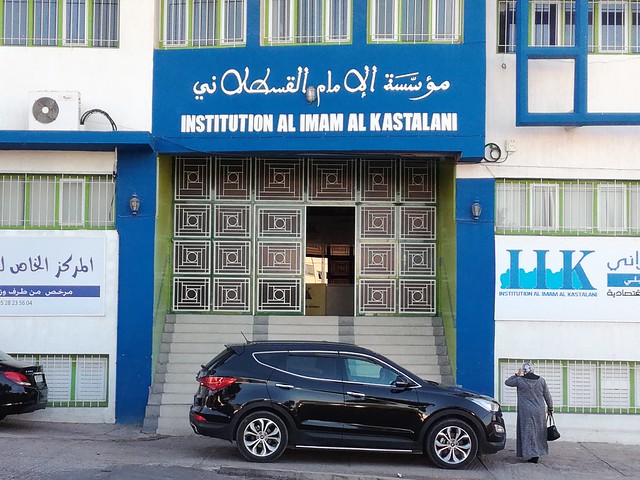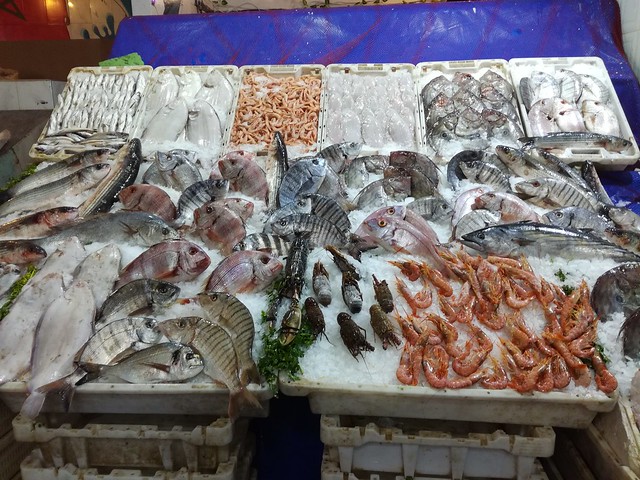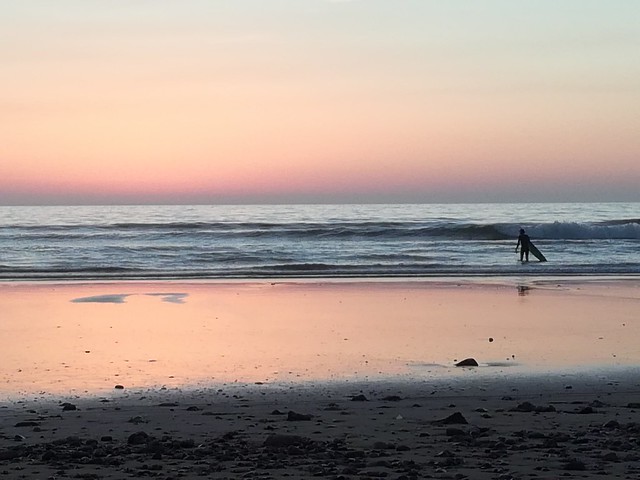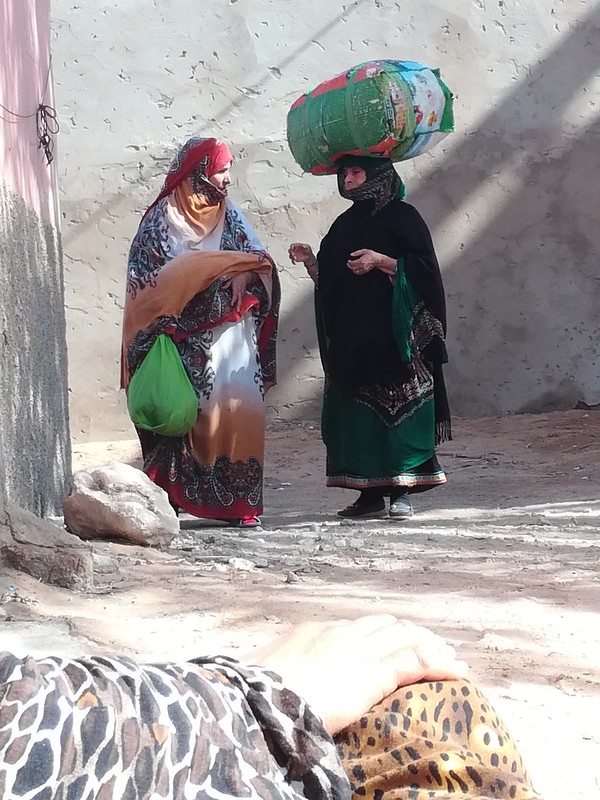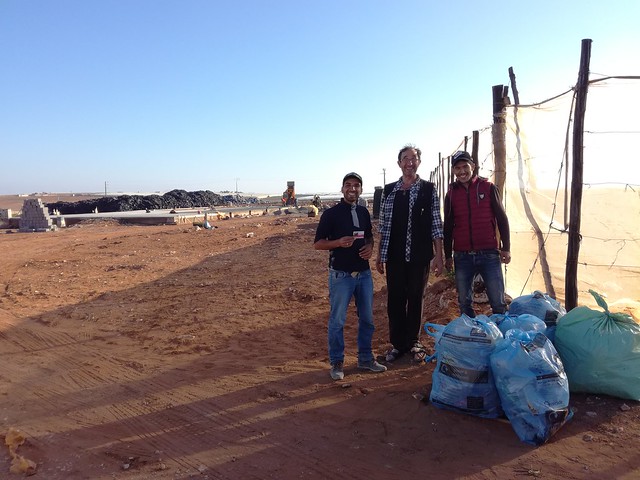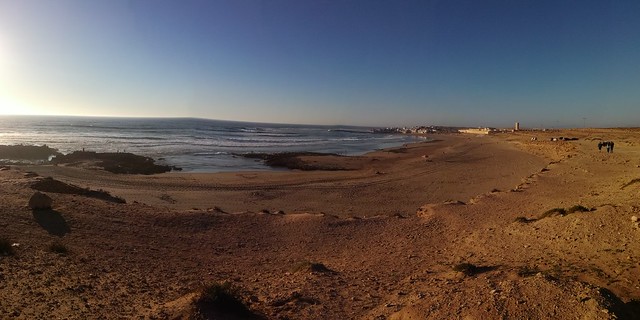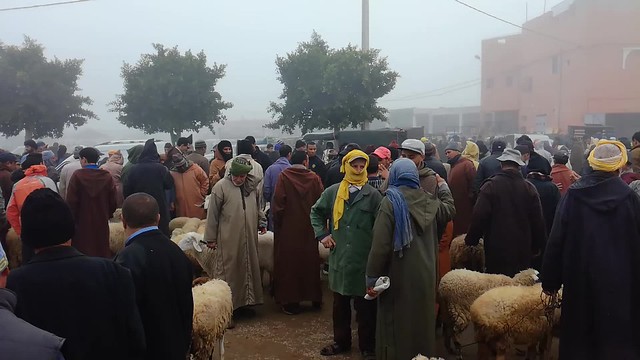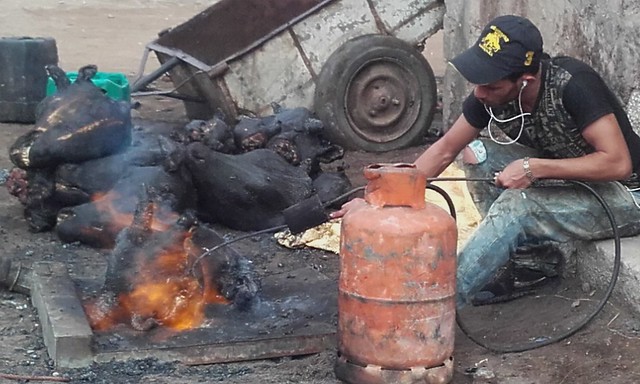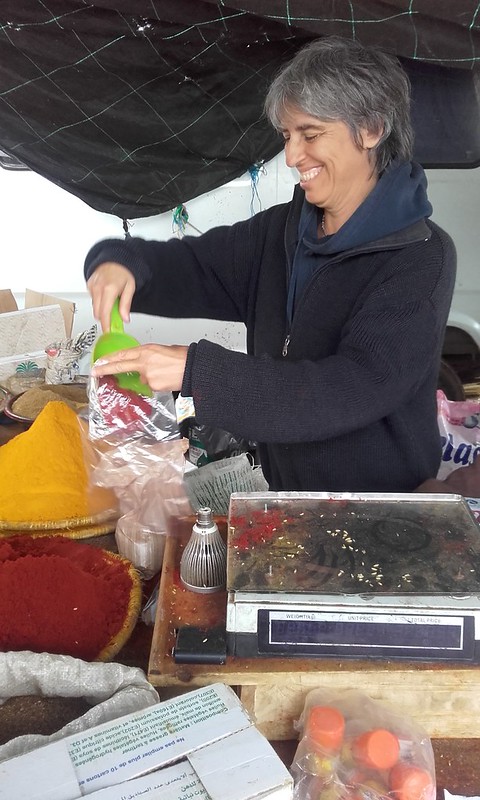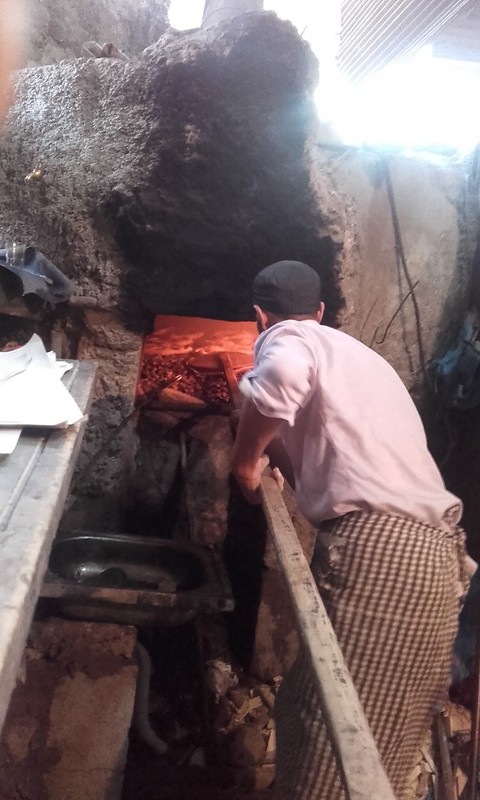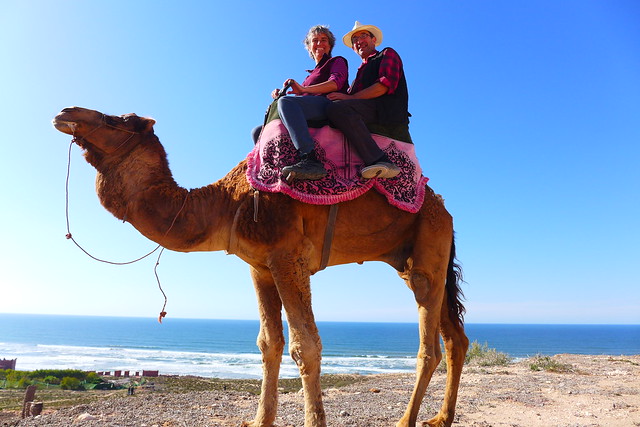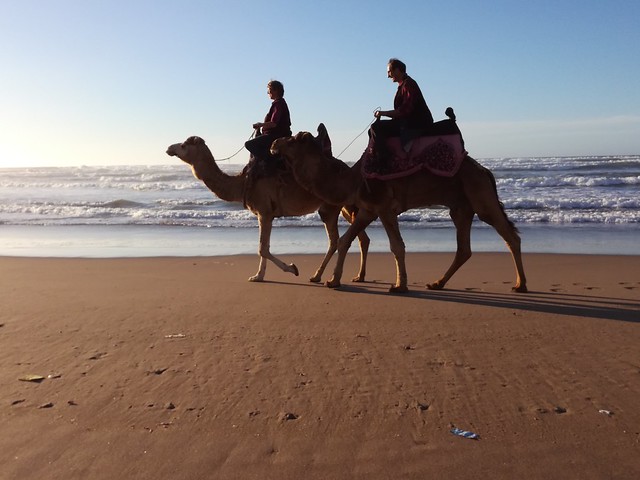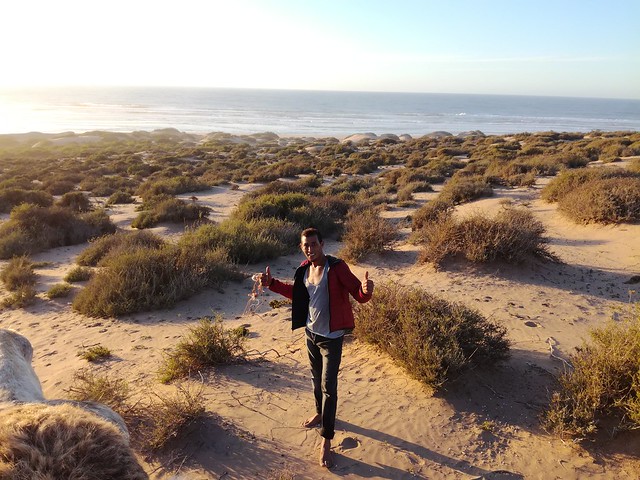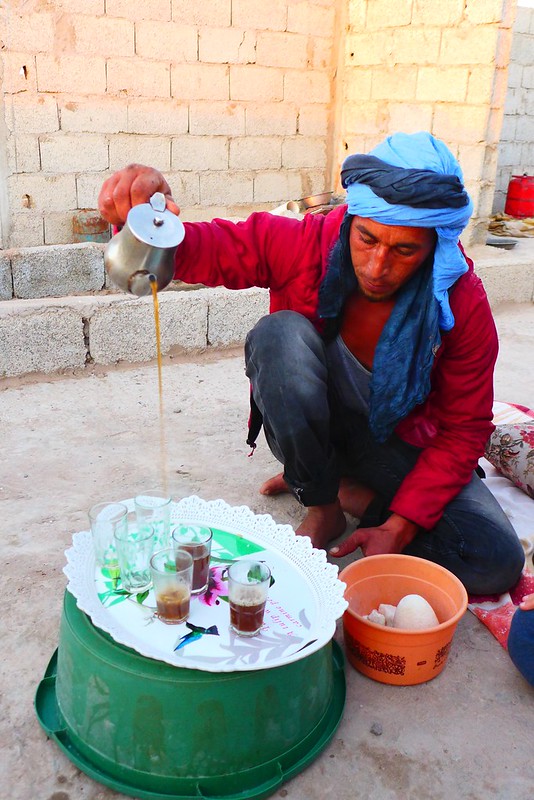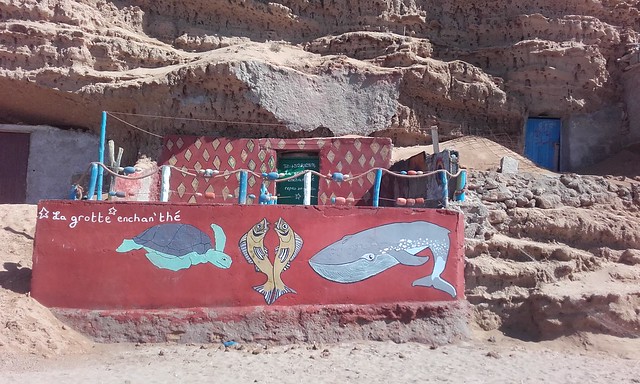Dodgy Moments, or Serendipity?
Generally we have felt super safe in the whole of Morocco (admittedly, we skirted the big cities, but big cities anywhere in the world are places where crime is more likely). So what I will describe in this chapter is a rare occasion.
We’re on our way to a park4night spot by a lake just north of Oued Zem. It’s been a long day crossing the countryside on small roads through the middle of beautiful nowhere.
As we approach Oued Zemm, Google Maps leads us around the centre but just before we get to the road that will take us to the lake, there’s a level crossing that is out of action, so we have to retrace our steps and pass through the centre of the town. It looks like quite a rough town. At some point, I notice gangs of teenage kids having stone fights, some of them going across the road we are passing through. It feels a bit dangerous, even though they are not aiming for us, but it feels like we could easily be caught in the crossfire, and the stones are not small. There is a lawlessness about this place…we are glad to get away from the town unharmed.
Several miles further on, the countryside takes on a rather forlorn character. We go down a bumpy road into a valley that’s out of phone reception, the GPS stops working and we seem to be the only ones around. Then we pass a dutch campervan and they motion us to slow down. We stop and meet up with them. They are on their way out of this region, having been warned by a local to go any direction for at least 25 km as it isn’t safe here. In addition, they say their van was swarmed by about 30 kids in Oued Zem on the main crossing with no-one coming to their rescue and the kids getting quite agressive, climbing the van and doing things to it. They were visibly shaken by this experience and wanted to know what our experience in the South and further inland had been. As we only had good things to report, we were able to calm them down and reassure them that going further South was ok. Frank and I debate for a little while whether we should heed the local’s advice and not stay by the lake. In the end we too decide to leave. We have a rule that if one of us doesn’t feel safe with something, we heed it, no matter if concerns are rational or not.
So we get back in the van to drive another 25 km in any direction. On the small roads that takes about one hour. When we reach the big road, we pass by an Afriquia fuel station. Frank remembers Jose’s advice that if we ever are desperate to find a safe place for the night, to ask at the gas station, so we turn in.
It’s late and there’s just one guy in the station. He says no problem, park up anywhere you like. By the way, it looks like you have a flat tyre and indeed, one of our tyres looks very flat. Just as well we didn’t stop at the lake in the middle of nowhere with no phone reception and a flat tyre! Instead, we park up by the airpump, so that next morning we don’t have to drive at all before checking the pressure! Five minutes after settling in, there’s a knock on the door – Abdelghani, the guy from the fuel station, delivers two glasses and a teapot full of berber tea…
We retaliate by bringing him a bowl of our piping hot lamb and prune stew, which he responds to by turning up with some mandarins. We deal the final blow by bringing him some dates from Ouazarzate. Each time, we chat a little. I think he’s never met foreigners like us, people who bring him a meal to eat…
He shows us pictures of his family and tells us of a souq nearby that is taking place tomorrow. Well, we know where we are heading for tomorrow then…
What a day! Again, we feel like we’ve been tossed one way and the other by this country – from spectacular vistas to fighting teenage gangs, from dodgy town and lakeside to the safety of a fuel station. And, quite unrelatedly, heeding the warning about safety brought us to a fuel station and an air pump just when we needed it.
Posted in Uncategorizedwith comments disabled.
Ouzoud
We’re skirting the outside of Marrakesh on our way to Ouzoud. It’s tempting to stop, but even more tempting is the idea of communing with some monkeys by a waterfall. Morocco’s cities can wait until another time.
On our way to the waterfalls, the landscape gradually lifts itself up as we enter undulating valleys, heady with the scent of almond blossom.
By nightfall we have reached Ouzoud and park up in a large car park. The guardian comes and tells us it will cost 20 Dh to stay the night, and if we wanted to stay somewhere for free to go up the hill to another car park. Having been warned of the cost and given an honest option to decamp, we are quite happy to stay.
The waterfalls are indeed spectacular to view, although the joy is a bit marred by the shantytown of restaurants all along the way. It’s hard to see the nature when it’s so overrun. I think it’s great to come here early in the morning and have the place to ourselves while the tourists are still asleep. Although the afternoon light must have a stunning effect as it falls directly onto the cascades.
Being the first ones, we are all alone up on the viewpoint. A bit of tongue clicking brings out the monkeys. We have no food for them, but still, Papa monkey very generously walks towards us and sits down in the optimal photo position, as if he knows that that’s what people want.
We have a few precious minutes with him and his family before a pack of dogs interfere, making them hiss and scatter into the trees. One monkey has a limp and a big scar on one leg. It looks like the dogs have got him on a previous occasion.
The cascades are stunning. It’s a long way of steps down to the bottom and consequently a long way up. An enterprising person has had the bright idea of putting a set of scales near the top where for a dirham you can weigh yourself before and after! Unfortunately I only discover it on our way back up.
We’ve been told of a Souq nearby, something we cannot ignore, so after our trip to the waterfall we’re off to find our favourite Souq Breakfast of fried fish.
Yet again, it’s a delight to stroll through this souq, lively and vibrant with people and animals mixing and mingling. We sit down for our breakfast on a rickety bench, side by side with young men impatiently calling out for their food, watching the world pass by, inhaling the scent of herbs and spices and listening to the sounds of callers mixing with the occasional squealing of a chicken or bleating of a sheep being carried past. When we’ve finished imbueing our food, spiced with the general atmosphere of the souq, we continue our journey through the almond valleys and on to Oued Zem. We stop for lunch at a high point with spectacular views, overlooking a reservoir, before zigzagging up even higher and eventually being released into a huge and fertile plain.
For more photos of this chapter, and there are many more of monkeys and waterfalls! Click here
Posted in Uncategorizedwith comments disabled.
Omar’s neighbours
At one end of the farm’s property lies a compound of traditional mud and straw buildings housing Lahsan, his wife and his mother, as well as four children aged 1-14. While the men go off to work on the various projects away from the farm, the women stay at home and I see them occasionally working in the fields or the polytunnel, but mainly they are in their houses looking after the children and making food for everyone, including bringing us a lovely couscous dish one day.
On the days that there’s no school, we see the older girl looking after the little boy and in the afternoon when his father returns, we see Ferid, the oldest child, helping him measure out the spots for the trees. We get to talk with Ferid, he’s bright and once we have his confidence, he’s quite talkative. He’s hoping to study something, maybe he’d like to be a doctor (although Omar tells me that last month he wanted to be an agronomist, so it’s not that fixed yet…
For Omar it is clear that Ferid needs to learn English to have access to internet knowledge. He asks us for some hints on how to teach him English. It is shocking but of course true, just how much English is the gateway to knowledge.
One day, we take Ferid away from watching cartoons to come with us on a cycle ride to the nearest shops about 3km from the farm. Along the way, we chat about this and that and he’s very willing to explain whatever questions we have and help us find the things we hope to buy, like Leben (a type of Buttermilk, maybe mixed with Kefir), which we like particularly if it’s Beldi (home made), but to find that you have to know where to look.
When we return, the mother and grandmother have prepared some tea and baked some bread for us. They insist we stay for some food. They scramble a few eggs too and make Ferid bring out chairs and a table and sit down with us. It’s lovely to see how they teach him to be a host – he’s the man in the house in that moment, as his father is out working. They literally make him sit down and converse with us. He is quite shy but he obliges and in the end I think he likes it, as it gives him a chance to practice his French.
We have noticed before just how strong the older women in the farming communities are, and how contented and happy. It shows in their beautiful faces. This family’s grandmother is no exception. When we leave, they grant us the rare opportunity to take a photo of them all. We take Ferid back to the farm with us and on our little portable photo-printer, we print out some of the photos for him and his family.
One day when we think we are all alone on the farm, we see an older man walking round the outside of the house – someone who from his gait doesn’t look like he’s a Moroccan. Frank goes out to meet him and it turns out it’s Cabou, the neighbour from across the fields, who’s come to look for Omar (although I think he might have also come to see who we are – he tells us he’s been observing our van for the last few days). He’s brought along a bottle of the most delicious home-made grape juice, which we ‘retaliate’ with a jar of Frank’s lemon and bergamot marmalade. He wants to know the recipe and the method…
Cabou is a handyman, and as Frank is looking for a heavy metal implement to help him make the holes for the trees, the two of them go over to Cabou’s farm to get something. Frank’s gone for a couple of hours and when he comes back, his eyes are wide. Cabou’s house and land is for sale and Frank is dead impressed by it. There’s a house and adjoining it 8 rooms for B&B surrounding a court yard. A large piece of land lies behind the house, sporting an olive grove, a vineyard with 300 vines, as well as plenty of open land, bordered by a big barn at the end of the property. When Cabou extended the house, he used earth from the garden, digging a deep hole that was then to become a ‘Cave’ with a beautiful, vaulted stone ceiling. Cabou is in his 80s and he wants to sell up and move to his much younger wife’s family in Azrou, so that when he dies, she has the support and company of her family. On the other hand, he says, he’ll be also content to die here where he has happily spent the last decades of his life. It’s a win-win, and although he’s 83 years old, he’s sharp of mind, strong of body and with a bright sparkle to his eye, so I reckon it will be a while yet before he dies.
Later that day, we go again together, but I don’t take to it like Frank did, and I think he too has his doubts on second viewing. But it’s always interesting to see what people have created. Cabou is an inventor who used to work for Peugeot, and his place is full of ingenious practical details. He doesn’t shy away from experimenting, even if some things fail. It’s par for the course when being an inventor!
Posted in Uncategorizedwith comments disabled.
Marrakesh Organics
We were very curious to see a farm with a permaculture approach here in Morocco. Our first impression came via the web: Marrakesh Organics has a very professional, well-formulated and informative web site … all the way to letting you see their business plans! The idea is that from the start about three years ago, they’ve recorded what and how they are doing and made their experiences available, as a resource, to other farmers in Morocco.
Next, we meet Omar, co-founder of Marrakesh Organics, a young and dynamic man in his 30ies. Having spent his childhood in Morocco and then spent 7 formative years in the USA, he has one foot in each culture. His grandfather started this farm and when he died in 2013, Omar, who’d had a close connection to him, felt the call to return to Morocco to continue his Grandfather’s work. We have a saying here in Morocco that if you plant a tree, you are responsible for its wellbeing, he says. In that sense, it feels good to be continuing what my grandfather started. When we began two years ago, the trees looked malnourished, but now look at them! We have installed drip-feed irrigation, we have fed them compost and planted nourishing crops beneath them.
As we walk across the fields, we can indeed see the difference – right at the bottom end, there are some trees they haven’t got to yet, with their programme of feeding and they are way behind in their growth, even though they were planted in the same year.
Permaculture has taken a bit of a back seat, Omar admits, as the land and the trees needed a lot of nourishment first, before he can think of a no-dig and no-watering method. It’s not off the table though – once there is a better balance in the soil, he wants to move towards the permaculture principles. It’s not just a question of balance in the soil; if there was an unlimited amount of time for the soil to regain its own health, then one could start with the permaculture principle right away. However, there is the need to make the farm financially viable asap, so Omar and his team (Kenza his wife, Mustafa and Lahsan) have chosen an interim method. In fact, part of the method includes taking on a number of other projects outside this farm to make money, in order to subsidise Marrakesh Organics. So, after two years of activity, right now work on the farm is laying low while Omar travels every day to oversee his various projects in the region, from pruning Olive trees for propagation to planting verbena on a large scale. He has a strong mind for running several projects at once, working out their viability, and a seemingly unlimited supply of energy to make them happen.
Omar is quite clear, on his website and also when we meet him, that his time is very precious, so we are a bit surprised to find him being happy to hang out with us in the evenings after returning from a long day’s work, as well as preparing a wonderful Moroccan breakfast one morning. I guess we all took to each other and sometimes it’s nice to push aside the pressing needs of the day and just hang out and chat, or maybe in the end his Moroccan nature won over and he created space in his otherwise tightly packed, western-feeling schedule 
Watching this young man and his energy, I wonder what it must feel like to be coping with the demands of two such divergent cultures. Quite likely in both of them, the 30s are the years where one has to prove oneself to one’s surroundings, family and peers: The building of one’s career, one’s house/home and one’s family all converge (I so remember the feeling! And watching Omar, I realise how much I have changed and moved into a different chapter in my life). Where there may well be a fundamental difference between the cultures is what they each consider to be a successful career. I imagine that agriculture here has a much higher status than it does in the first world. Education is a value that both cultures share, and to create a learning environment on the farm is a good way of combining the two cultures. As it develops and offers all sorts of courses, I can really see its potential for providing a good meeting point for people from different walks of life.
We spend a few days at the farm, enjoying its peaceful nature and getting some of our stuff done (such as doing our washing and writing the blog) as well as satisfying our yearning to touch the earth by working a bit on the farm. Frank clears a hedgerow of dead wood and I remove several rows of blighted tomato plants from one of the poly-tunnels. We use the dead wood to make a fire to burn the tomato plants. Somehow, we manage to fall out over making the fire. It happens so rarely that we are out of kilter with each other (at most once a year), that it is a bit of a shock to the system and although it wasn’t a big thing, it takes us a couple of days to truly clear the air and re-establish our usual harmony. Meanwhile, Frank makes marmalade and I make chutney from the green tomatoes. One day, a large load of assorted fruit trees arrives and we are privileged to share the excitement and help to take them off the roof of the car.
The next day, while Frank starts on the digging of holes for the trees, I help planting out courgettes, cucumbers and squashes in the poly-tunnel.
One evening, we invite Omar to a Tajine at Restaurant Rozelaar. Frank is very nervous about cooking Moroccan food for a Moroccan, but all goes well. We eat and share stories… through Omar’s tales, we learn a bit about the Moroccan way of making deals. For example, a manager of a big olive estate may earn twice when it comes to pruning the trees -once from the owner, who he will invoice to pay the workers for the pruning and a second time by charging those who want to buy the cuttings for propagation or for animal fodder. The buyer might even be the one doing the pruning! My German mind boggles. I want to suggest that the buyer directly gets in touch with the owner, thus cutting out the middleman and possibly neither having to pay anything and both being better off for it, but that’s obviously not the way things work here.
I now realise why we might have rubbed Ali, at Lezagmouzen camping, up the wrong way when we went to see Ahmed, the owner of the campsite, to discuss the possibility of buying it. There’s something about the power of the middleman here that I don’t quite understand.
On the day we leave, we give Omar a lift to one of his projects and we share lunch in a nearby café. Frank wants to buy some good quality meat and we learn from Omar that you need to signal to the butcher that you are happy to pay more than the advertised price. Otherwise they will have added fat and bone to make up the weight. A very valuable lesson for shopping in Morocco!
It’s hard to say good-bye. Even though we only spent a few days with Omar, we feel like we are leaving a close friend. We obviously have to come back, insha’llah, and meet his wife too next time, insha’llah.
For more photos of this chapter, click here
Posted in Uncategorizedwith comments disabled.
Motorway
For the first time since entering Morocco, we decide to take the motorway. From Agadir it rises up steadily through high mountains, and once more, we are dumbstruck by the spectacle unfolding before our eyes – the rock formations, the colours, combining with the afternoon light.
We let the scenery sink in while we roll through this outer end of the Atlas mountains, emerging the other side and continuing on national roads through, yet again, another totally different landscape. By nightfall, we arrive at a reservoir, where we light a fire, have dinner and read through the web site of Marrakesh Organics, in preparation for next day’s visit.
Next morning we find a sparkling reservoir stretching out in front of us. After breakfast, we continue to travel through ever changing landscapes. By the evening we have reached Marrakesh Organics.
For more photos of this fantastic landscape, click here
Posted in Uncategorizedwith comments disabled.
Chases
We are woken early next morning by a chorus of barking dogs. I look out the window and see a very trendy-looking jogger being confronted by a pack of dogs. He’s jogging on the spot, obviously considering his options. Then he makes his decision and suddenly starts running right through the dogs who’ve positioned themselves to block his way. What follows looks very funny but is most likely not funny at all for the person experiencing it. I don’t know what hyperbole made him think he could outrun them, but his sprint quickly changes to a mad hop, as the dogs snap at his heels. Suddenly he changes tack and turns around to chase them. They think this is a delightful game. One dog had probably bitten him, because he singles it out and chases after it, trying to pick up stones and throwing them while running at full tilt. But he has no chance against them, and while the object of his wrath is easily escaping him, the others are again snapping at his heels. Eventually he gives up and sits down, exhausted. The dogs immediately leave off, having lost interest.
I know I shouldn’t laugh, but he looked so wrong in these surroundings, so tarted up, manicured and fake-bronzed, with gleaming white jogging clothes and a long mane of curly golden hair – the dogs probably thought they were defending their territory against an alien invader.
After breakfast, the first surfers arrive. One drives onto the beach and sits for a good 15 minutes in his car, staring at the waves. It’s not very impressive this morning, the wind having finally calmed down. It’s even calm enough for Frank and I to go for a quick swim! We get chatting to the surfer, a guy from Ariège in France, who, after listening to our travel experiences, recommends visiting his native area. You will like it there, he says. Well, we’ll go and have a look. It is lovely to feel how much smaller Europe has become in my mind through our travels, and especially now that we have stepped outside of it.
We say goodbye to each other and while we get Emma ready to depart, our surfer climbs into his car and is off to chase waves on a more promising beach.
Today, we want to travel northwards quite a bit, but first we have to make one more effort at finding LPG in Morocco. (We are on our second bottle now, and just imagine if we run out, it would be dramatic for Frank who needs to cook to feel happy! It’s his way of grounding himself and digesting our experiences. Mine is to play the bandoneon or write the blog, so I often find that while I practise, the kitchen cleans itself and dinner cooks itself. Lucky me 
We’re on a bit of a wild goose chase with this… The internet says, Gaz Afrique has LPG in Morocco, in fact, they hosted an international conference on it some years ago. There is a depot just north of Agadir, so that’s our first port of call. They send us to a fuel station, who direct us to another depot fifty miles South. We are clever enough to get someone to ring instead of going there. On the phone, we hear they don’t sell it anymore to the public. Apparently Marjane, the large supermarket chain in Morocco, used to do it and also some camp sites, but they all turn out to be dead ends, so eventually, we give up and take the motorway north out of Agadir.
If anyone knows of a source of LPG in Morocco, please let us know!
With hindsight, what we should have concentrated on buying, instead of chasing after LPG, was Amlou (Almond butter, mixed with Argan oil, which apparently is a speciality of the Agadir region), because it turns out that our two bottles of gas see us right through our time in Morocco, while the pot of Amlou in our cupboard seems to be evaporating at an alarming rate!
Posted in Uncategorizedwith 2 comments.
Agadir
Agadir is our first big city experience, previously having skirted around Fez and entirely avoided all other cities. We take the long route round the outside, to the north of the city. For once, park4night leads us the wrong way and we get lost in a rather posh area of Agadir, where every street has its own security personel in little huts, guarding large houses hidden behind high walls. Someone stops and tells us, in no uncertain terms, that we cannot stay the night here. While we are looking around for the car park listed in park4night, the spot marked on the map suddenly jumps to another part of the town. Half an hour later, we arrive safe and sound in an area that is much more to our liking – a large and varied souq at the end of the road, and just by the parking place, I spot a Hammam too!
We are both very tired, so we leave exploring to the next day.
I must have been very, VERY tired last night, because in the morning I find that I’d misread the sign – what I thought was a Hammam is actually a school for Immams! They are a bit alarmed as I walk in and ask for the Hammam opening times. I might well have been the first woman in that building 
The car park is lined with Peppertrees and one end of it has a little city garden, with many different plants growing in old tyres. We strike up a conversation with the owners who sit in their little green paradise. There are a number of interesting plants, including a perennial Basil bush and one plant that self-seeded and they are waiting to see what it will be. It looks like a citrus fruit.
We had chosen this car park because of the vicinity of a mechanic for campervans, but when we cycle past it, we can see it’s not the right place to have Emma’s nipples greased. Our other mission is to meet someone by the market square who will have a computer charger for us. Ardent followers of our blog may remember that right in the beginning of our time in Morocco, my computer blew its battery, and ever since, I’ve been dependent on proper electricity which has meant a lot more stays in camp sites than usual. This computer charger will free us once again, as we can plug it into a cigarette lighter point.
It’s a Monday morning and we cycle through a busy industrial estate until we come to a large road that leads in a big sweep towards the sea, circumventing the King’s summer residence. We stop by a guard and chat to him about how to reach the King. We want to speak or write to him about our experience of Morocco. We end up having a long conversation with the guard about travelling, languages and families, and about the friendliness of the Moroccan authorities – the gendarmerie, the police and the military.
Then we cycle, by the side of some steps, down to the bay.
Agadir has made a big effort to present a clean, spacious and Europe-oriented seafront, and I think they’ve done a great job. It’s not my cup of tea, and I’d not fancy holidaying here, but for what it is, it’s beautiful: clean beach, many restaurants and a large promenade which goes on for miles. We enjoy cycling along it all the way to the industrial harbour, where Morocco returns with a vengeance and we delight in diving into the fish market. We buy a good-looking fish from a vendor who proves the freshness of his catch by throwing flounders against the wall where they stick for a few seconds before slipping to the floor.
Cycling back to Emma is quite a task. We hadn’t noticed just how much downhill was involved. 10km later, we are back at the van, well worn out and ready to leave the hustle and bustle. As cities go, Agadir seems quite a good one, but we prefer the countryside. We pack up and head further up the coast. There’s a little town called Anza just north of Agadir, where we stop off on the cliffs for lunch and a rest, before driving on to find a bit of hopefully deserted beach. By sunset, we are on a surfer’s beach, host to a wild pocket of temporary shacks, stray dogs, women on donkeys and barefoot boys playing football, all over-shadowed by half-built apartment blocks.
For a few more photos, click here
Posted in Uncategorizedwith comments disabled.
Latifa and Smahim
That afternoon, we have an appointment with Latifa and Smahim who we’d met a few days before, when we cycled to their village along the seaside. Their children’s bikes needed some maintenance and Frank had offered to drive by, with all our workshop tools in the back of Emma, to fix them.
They live with their two children Sarah and Mohamed Ali on the edge of Douira, another little seaside village in the middle of the national park, where Latifa runs a tiny grocery store, out of a window giving onto the street.
After some Berber tea, Frank goes to repair the bikes and I sit in the sunshine chatting with Latifa, when who should come round the corner but Betoulla, the woman we gave a lift to about three chapters ago! She recognises us too and there’s a lot of laughter and explanation in about three languages to our hosts. It turns out, Betoulla is a travelling saleswoman, hitching from village to village, carrying her wares in a big bag on top of her head.
We arrange to give her a lift back to the main road later, which prompts Latifa to invite her to stay and share lunch with us all. There is a lot of humorous banter during the meal, as Betoulla is looking for a husband and a wife for her son. The wife should preferably be European, and she enquires about my two daughters – would they be interested in marrying a nice Moroccan man? I said, I could ask but that in our culture the young ones make their own decisions about who they want to be with/marry/ Ah, she shrugs, what a shame. But did I know of a rich old man who she could marry? preferably one who would die soon!
After dropping Betoulla back at the main road, we turn our attention to the mission of finding a recycling centre. The internet is not conclusive but there seems to be one in a village nearby, so we go in search. The first locals we ask don’t seem to know about it, but someone in a cafe knows and jumps into Emma to show us the way. Half a mile into the fields, there is is a fenced-off enclosure where construction work is going on. The foundations for a large building has been laid and there are huge mounts of predominantly agricultural plastic. We drive in and meet a few young people who tell us that the plant is going to be up and running in a couple of months. Once they understand that they don’t need to pay us for our rubbish(!), they gladly receive it and thank us for the initiative to pick the litter off the fields.
I have hope for Morocco. The general attitude and awareness for the plastic problem is much higher and more positive than anything we have experienced in Sicily in the last few winters, where people mainly thought we were bonkers picking up the stuff. Here, people help and also appreciate that while the situation has ameliorated since the national ban on plastic bags about two years ago, there’s much more to be done.
We finish off our day with a quick drive to the seaside for Frank to have a swim before heading off to Agadir, where we are due to pick up a parcel the following morning.
Posted in Uncategorizedwith comments disabled.
Misty Morning Adventures
This campsite, the village and its beach are amongst the loveliest places we’ve discovered in Morocco, but even so, this morning, we are ready to go. There’s a fine sea mist over everything as we rise at 6.30am. Everyone is still asleep when we leave the site at 7, as quietly as we possibly can, given that we are starting a 7.5t lorry!
We stop at the entrance of the village and walk to Yesin’s house to pick up our 5 bags of plastic rubbish. The village is still asleep…apart from one or two people. Yesin’s mother is up and bids us farewell. Whilst dragging the sacks back to Emma, we meet three people and have a little ‘rubbish conversation’. They are surprised and very grateful for what we have done and wish us good luck in finding a recycling centre, as they don’t know of any in the region (I have visions of living with these sacks of rubbish all the way to Marrakech!). We are so busy talking about rubbish that we don’t realise these people are hanging out at the entrance of the village in order to hitch a lift to the nearby souq!
Never mind, someone else must have picked them up, because they arrive at the same moment as us. Meanwhile, we’ve picked up another hitchhiker who shows us a car park that we’d never have found on our own. We pay the attendant a few Dirhams, persuade our hitchhiker that we will be able to find our way back to Emma (otherwise he would have accompanied us for the morning) and then we dive into another souq adventure. This one is huge, and it has a large animal section. Maybe other markets had them too, but we may have just missed them- you obviously have to get there early. It’s about 8am, and although the mist makes everything look sleepy, it’s rush-hour in the animal section. There’s a real throng of men and in between them animals of all sorts, sheep, goats, cows, chickens, ducks, pigeons and rabbits. There’s quite a cacophony going on, but it’s not the animals making the sounds but cars hooting their horns trying to get through an already overcrowded street. Goats are lying on the ground with three legs tethered, shaking with fear, eyeing up heavy boots coming perilously close to treading on them, little lambs are bleating for their mother who’s being pulled along on a thin string. Quite a few people are there just with one or two animals. There’s a lot of talking going on, eyeing up of animals, opening of mouths and checking teeth.
Frank and I squeeze through the men and animals (I seem to be the only woman on the market!), until we get to a calmer row of stalls. We are looking for a few things; vegetables, bread, maybe oil, maybe almond Amlou, maybe some tajine spices… at this time of day, many stall holders are meeting up behind one of the stalls, squatting on the ground to share some breakfast. We get invited, but politely decline and use the time to walk around the whole souq. One corner has a few young men with flame-throwers, singeing animal heads and feet. What for, we ask. Apparently, it’s good meat. It creates quite a stench.
This souq has everything, from construction materials to spices and vegetables, from handmade tools to freshly pickled olives and bergamots.
We find some good olive oil, agree on a price and have to go to a hole in the wall to pay for it. In our search for other things, we pass by the same stall several times, so that by the time we get to buy the oil (plus various spices and three kilos of prunes), we feel like friends to the stallholder. He motions me to come behind the till and serve his customers!
Near the veg stalls, there’s a long queue leading into a bakery. This must be good bread, so I queue while Frank goes to buy the veg. As I said, I’m the only woman in the market (And there are thousands of people), and I have a hoodie on, so some may not have realised my gender. The queue for bread is getting a bit unruly, people talking loudly around me and I’m being elbowed and the guy behind me is moving up far too close for my liking. Eventually I say ‘un peu de respect, un peu de distance s’il vous plait!’ and suddenly there’s a slightly shocked silence and an instant space opens up around me. From then on I get addressed very courteously and given space 
The bread is indeed worth waiting for, and once Frank has returned and can protect my back, we are inside the shack and able to see the baker in action
Visits to the souq are not for the fainthearted, and after a couple of hours of immersion, we are well souqed out and ready to return to the silence of the roaring sea. On our way out of town, we pass by some buskers who seem to have attracted a huge crowd by building up their act with a lot of talking. We don’t stop for long though, as we are tired and hungry. We don’t even get to drive the 10km back to the seaside but stop somewhere in a field to have lunch and a nap.
**********************
For more photos of this chapter, click here
Posted in Uncategorizedwith comments disabled.
Yesin
One afternoon there is a hollering outside the campground. I look over the wall and see two guys with two camels. Was it you who was looking for wood? They ask. Yes, but we hadn’t bargained for a Camel ride. It turns out though that the camels are there to transport the wood, and that in fact, we cannot come with, as the provenance of the wood is secret. We show them the size of our wood store and they tootle off. Two hours later, they return with two large bundles of lovely wood. While the camels are here, don’t you want to try sitting on them – take a photo? It’s a looong way down!
And now that you are up there, don’t you want to go fro a ride? A camel ride on the beach in the sunset is a must, it turns out, and Yesin’s animals are a fine pair. They are much larger than what we have sat on in the Erg Chebbi desert, and the saddles are a lot more comfortable too. When we go down hill though, it seems a long way down to the ground from up where I am sitting, and Yesin’s stories of my Camel being a racing Camel aren’t really confidence inspiring. I get a bit of vertigo but luckily nothing happens and we safely reach the beach, where he lets go of the lead and leaves us to steer the big animals ourselves.
What a joy to be riding along the beach in the late afternoon sun! We chat about Yesin’s life and he shares his joy at his work – he loves working with the Camels, walking them up and down the beach, meeting tourists, or transporting heavy goods for locals. He doesn’t like being in a house, and I can well believe that, looking at him, lightly stepping barefoot across stony and spikey ground and boiling hot sand.
I ask if the Camels like the sea. Oh, yes! Says Yesin, so I take my Camel to the surf. A large wave comes along and swills around her feet. She loves it and makes a gathering motion with one of her front feet to splash her belly. Yesin is busy receiving a phone call and for one moment he doesn’t pay attention, which is when my Camel moves to sit down and roll in the water. She is half way down on her front legs when Yesin comes hopping into the sea, shouting to stop her. He gets his trousers all wet but saves me from drenching myself and possibly being rolled upon. He can’t stop laughing about if for the next five minutes – neither can we!
Our Camel ride ends at his house where we are invited to have a cup of tea and meet his mother.
Yesin tells us about the beauty of the estuary and we agree to meet early in the morning to go and watch birds together.
He’s very smiley and gentle about it all, and so a Wood Action leads to a Camel Ride, leads to a Walk in the Estuary, and everything is framed by friendly cups of tea. Some Moroccans really know a thing or two about tourism!
The estuary is indeed worth an early rise. We see countless birds – cormorants, turns, curlews, large and small ibis, and even an osprey! On our way back we come across a couple of Mongoose – the first I have ever seen.
Yesin’s mother has made fresh bread, so we have breakfast on the terrace enjoying the view… except there’s a lot of plastic on the fields. After the breakfast, we take some plastic sacks and go to clean the fields. Yesin seems a bit uncomfortable about this, maybe because he needs to go and work on the beach, but we just go ahead and do it ourselves while he prepares his animals for the day. Very soon, we are joined by two young shepherds and between the four of us it doesn’t take very long to fill five large plastic bags which we store in Yesin’s compound to pick up with Emma the following day.
Back at the campsite, Frank is having a rugby crisis – none of the internets work sufficiently for him to watch the game – while I saw up the wood we received with the kind help of Tjorven and Josua, two children of our neighbouring families, and then we have a walk on the beach together. This is quite an extraordinary beach: there are many troglodyte caves, dug in by the locals, many of them are temporarily lived in, some are restaurants and others storage caves for the fishermen. The whole coast is riddled with them. Driftwood doors and banisters with heavy rope; any flotsam and jetsam that arrives on the beach is usefully re-employed. We particularly liked the little restaurant with it’s double entendre name
The evening bears a lovely surprise: 30 young musicians from Germany have arrived, and although we have missed their impromptu performance of light classical music in the tent, we are privy to the local’s ‘revanche': an evening of singing and dancing around the camp fire. A group of musicians have arrived with some traditional instruments, including a Rabab, the moroccan fiddle.
What is a bit strange though is that these are all men. The two women who during the day work in the kitchen, make a short appearance on the fringe of the circle but all the singing and dancing is done by the men. Roundabout midnight, we’re cooked – we’ve had a long day – and we return to Emma, but the singing and drumming under the stars continues on into the night, tumbling into our dreams.
*****************
For more photos of this chapter, click here
Posted in Uncategorizedwith comments disabled.
